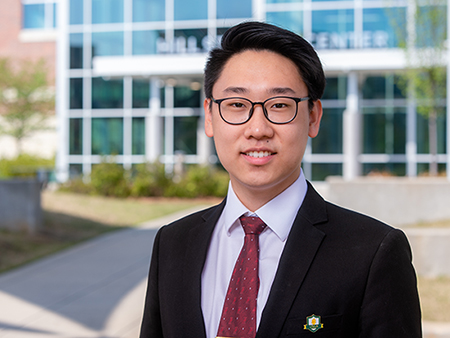University of Alabama at Birmingham Jason Zhang has been accepted into five elite graduate programs with offers of full financial support to continue his studies in the biomedical engineering industry. graduating senior Jason Zhang received offers of full financial support for graduate school from five schools: Massachusetts Institute of Technology, Johns Hopkins, Georgia Tech, Mayo Clinic Regenerative Sciences and Boston University.
Jason Zhang has been accepted into five elite graduate programs with offers of full financial support to continue his studies in the biomedical engineering industry. graduating senior Jason Zhang received offers of full financial support for graduate school from five schools: Massachusetts Institute of Technology, Johns Hopkins, Georgia Tech, Mayo Clinic Regenerative Sciences and Boston University.
Zhang will graduate this spring with a degree in biomedical engineering and a minor in mathematics. Those offers include full tuition allowance, student fees, health insurance and a stipend for five years minimum.
Zhang chose MIT, where he will pursue a Ph.D. in biological engineering. He has also been awarded a graduate fellowship from Tau Beta Pi, the oldest engineering honor society and the second-oldest collegiate honor society in the United States, and will receive a stipend of $10,000 to support his first year of graduate study.
Zhang is an international student originally from Xi’an, China. After he moved to the United States with his family in 2013, they moved to Montgomery, Alabama, in 2014 and resided there until his collegiate journey began at UAB.
He is part of the Science and Technology Honors Program within UAB’s Honors College, in addition to his membership in the Biomedical Engineering Society and Tau Beta Pi. As a resident assistant for three years, he also has been heavily involved with UAB Housing and Residence Life. He was trained in cell and molecular biology research by Zsuzsanna Bebok, M.D., associate professor in the UAB Department of Cell, Developmental and Integrative Biology.
The Honors College and the Science and Technology Honors Program played the most significant role in cultivating his academic interests and helping him elucidate his future career, Zhang says.
“The Honors College allowed me to form a greater network and gain exposure to diverse study topics,” Zhang said. “It also provided me with scholarships and fellowships to financially support my study and research. Finding a group of people in college who share my interests and values is not easy, especially as an international student. The SciTech program was the first community and ‘family’ that embraced me. I’ve felt a sense of belonging since the first day.”
Through SciTech, Zhang met his research mentor Dr. Zsuzsa Bebok, “who brought me into the scientific research world and trained me from a novice to an independent researcher.”
After taking higher-level BME courses, Zhang took a special interest in tissue engineering and quantitative biology. Through the 2020 Presidential Honors Fellowship, he explored computational biology research to identify available drugs for COVID-19 treatments in the lab of Yuhua Song, Ph.D., associate professor of biomedical engineering, which led to a first-author publication in the European Journal of Pharmaceutical Sciences.
Zhang says that UAB has been supportive of everything he wanted to explore and pursue throughout his undergraduate career.
“Through UAB Solution Studios, I worked alongside clinicians at UAB Hospital to solve real clinical problems — even as a freshman at the time,” Zhang said. “This clinical immersion experience became the motivation for my research and inspired my goal of translating lab findings to bedside patients.”
UAB will host in-person commencement at Legion Field on April 30, May 1 All 2020 graduates and spring 2021 graduates are invited to participate. Students must register to walk by April 16; register here.
With the support from the Office of Undergraduate Research, Zhang was able to travel across the globe to Oldenburg, Germany, to present his research and make connections with future scientific leaders during the 2019 World Congress on Undergrad Research.
“When I wanted to acquire skills in entrepreneurship, I found UAB’s sponsorship to become a University Innovation Fellow and receive training from Stanford University Hasso Plattner Institute of Design,” he said. “I probably matured the most as a resident assistant for three years. My supervisors from Housing and Residence Life mentored me professionally and cultivated my skills in management, leadership, problem-solving and community building. Because of UAB’s boundless opportunities, I was able to grow and mature into a determined person with a clear goal in mind.”
Although Zhang is thrilled about graduation, he says last year was not the easiest.
“It was tough at first,” Zhang said. “Classes were moved online with utter uncertainty at the same time while I was finishing up my SciTech honors thesis, writing a review paper with my research mentor Dr. Bebok, and taking the GRE. I lost many competitive opportunities that I worked hard for. I had the chance to present my research at selective national and international conferences, and I was excited about doing tissue engineering research at Mayo Clinic through their Summer Undergraduate Research Fellowship. It was hard to let go of these opportunities.”
Zhang says, despite all the losses, the pandemic also presented new opportunities. The time he saved from walking to classes allowed him to stay in the lab and produce more data. Virtual learning in the spring 2020 semester inspired him to take free online courses from Harvard University over the summer. He says he also had more time to self-reflect and plan for the future.
“UAB gave me everything: the resources, opportunities, mentorships, friendships and more,” Zhang said. “Here, I elucidated a future career in biomedical research; I trained under mentors that value my growth and developments more than their career advancements; I found my significant other and a group of supportive, outstanding friends. In this collaborative, kind and welcoming environment, I was able to grow my scholarship, leadership and character and genuinely enjoy my time as an undergraduate.”